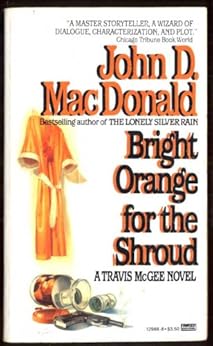
I understand that John D. MacDonald's fans believe that the adventures of his character Travis McGee should be read in sequence, as McGee was one of the few American series leads to grow and mature as the series progressed over a 21-year period. Unfortunately for me, I didn't start from the beginning, but with the sixth novel, 1965's Bright Orange for the Shroud. Apparently, MacDonald's publisher had him working on the first several books together, and did not even publish the first until the fifth was ready, and then released a new book every three or four months. Imagine a publisher doing that today: Scholastic with JK Rowling, for instance.
The book impressed me so much that I have three more McGee stories already waiting for me. The character isn't quite a private detective in the classic hard-boiled PI tradition, but rather a freelance operative who recovers money or assets in return for a percentage. There's something about him and his methods that reminds me of TV's Banacek, which makes sense. While MacDonald and McGee have faded in popularity over the years, they were extremely well known in 1972, when that series was made, and continue to influence the work of Elmore Leonard and Carl Hiassen, among others. The cynical eye on south Florida is also a hallmark of the more recent TV series Burn Notice. The more that I thought about Bright Orange for the Shroud, the more I saw its influence.
I was already very impressed by MacDonald's excellent prose and descriptions before we met the villain of the piece, and it's MacDonald's treatment of him that sold me completely on following this series. This book deals with McGee helping out a hapless friend who's been taken completely to the cleaners in a quasi-legal real estate scam. The con artists have scattered and the chump's new bride is long gone, but McGee agrees to help him recover what can be found. His hunt brings up criminals who really want nothing to do with each other anymore, and with good reason: one of them is a completely unpredictable and really scary guy.
I really appreciate it when writers give their protagonists really complex and intelligent villains. Boone Waxwell does not appear to be either, but he banks on people underestimating him and he really, really gives McGee an enormous challenge. I knew going in that fifteen novels followed this one, and yet I was really concerned about McGee. Waxwell is that frightening. I love a villain who forces our hero to keep improvising and changing tactics, and I love a writer who is up to the challenge and refuses to make things easy for his lead character. Highly recommended.
1 comment:
I loved these books. I read the entire series and have gone back and reread many of the book. What a great character.
Post a Comment